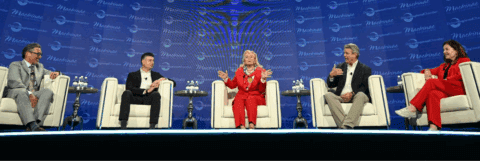- Both Democratic and Republican representatives emphasized that bipartisanship is key to addressing the concerns and needs of their constituents.
- AI is seen to be a big part of the economy of the future, but the lack of regulation and how to do so can hurt future generations.

Top Takeaways
Michigan’s Congressional leaders spoke during the 2025 Mackinac Policy Conference to discuss bipartisan efforts to improve the lives of Michiganders, develop strong policies to better position Michigan for competitiveness through innovation, and bolster the talent pipeline.
Working Across the Aisle vs. Ostracization
Colthorp opened the discussion with the congressional leaders on the biggest bipartisan successes in recent years, including the new fighter mission for Selfridge Air National Guard Base and its economic contribution to the state, as well as the funding of the Great Lakes Restoration Initiative.
When it comes to ensuring that projects such as these can come to fruition, across-the-aisle collaboration is vital.
“We’re not playing a football game; It’s not red team vs. blue team,” McDonald Rivet said. “We have to be able to put together long-term strategies … and be able to work in a way that we can agree on the direction that we’re headed so that it isn’t politically disrupted every other year,” she added.
Huizenga agreed with this and said, “There’s a lot of commonality and goals” that legislators share. Therefore, he suggested focusing on their constituents’ needs and representing those as they align with those across the aisle. Huizenga also said that bipartisanship can be achievable and is at the core of what they aim to do each day.
Dingell reiterated that many leaders within the state and across political lines have applauded Gov. Gretchen Whitmer as a high-profile example of this.
“[We] thank the Governor for being willing to work with President [Donald] Trump,” Dingell said. “She’s taken grief from people, but I think all of us here think … the governor is trying to do what’s best for Michigan.”
Michigan and The Future of Innovation From Michigan’s Congressional Leaders
As the conversation led toward Michigan’s economy of the future, AI became a focus for the speakers. The panel commented on the criticism that legislators are “woefully behind on understanding AI.”
“I’m elected to make sure that we have systems in place that have the guardrails necessary to allow for innovation without the exploitation in ways that are damaging to [innovate],” Barrett said.
“We need to be getting the guardrails up for AI,” Dingell said. “And we also haven’t gotten privacy legislation through in how many years? And not because privacy is a partisan issue, it’s because California blocks us every time.”
“I actually think we’re only beginning to understand what AI is going to mean in our day-to-day life, much less what it means for business,” McDonald Rivet said. “And I think we have [a] responsibility to ensure there are some guardrails around it because there are national security risks.”
When it comes to the consequences of being behind in AI,” Huizenga said, “I hear it all the time from crypto investors [and AI start-ups] that they’re looking for other places because we have not come up with our own basic ground rules here in the United States … we’ve got to get better, we got to move faster because technology in the industry is moving far faster, we’ve got other smaller, I would argue, less secure countries that are sort of setting the rules instead of us.”
This 2025 Mackinac Policy Conference session was sponsored by Consumers Energy.

Learn about the region’s economics, workforce and talent, industry clusters and more.
For additional information, contact the Data and Research team.
Contact Us





